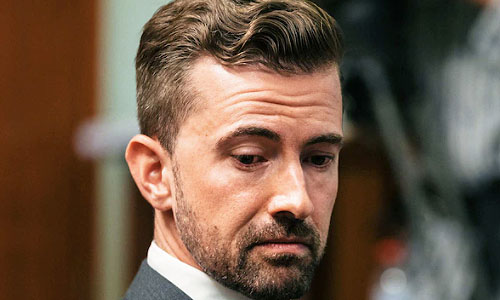In this city of Lviv, ancient churches with crumbling walled ramparts sit beside trendy bars with beautiful hipsters in carefully curated clothing.
Near noon on most days of the week, corteges for fallen Ukrainian soldiers drive up cobblestone streets to a cemetery increasingly filled with patriotic flags on grave sites – a place aptly called the Field of Mars. Locals stop what they are doing – drinking coffee or heading to work – and drop to their knees as the solemn processions wheel past.
Fit-looking young men wear the shorts of late summer; their newly installed prostheses are visible where their legs once were. The hi-tech devices give them the sleek appearance of cyborgs from space rather than that of invalided vets from Ukraine’s 1,400-kilometre-long front. Some of their peers, it must be said, rarely leave their homes for fear of being stopped for mandatory recruitment into the military – a process seemingly lacking in transparency and accused by many of corruption.
Three years into the full-scale war on Ukraine, signs of sadness and suffering cannot be avoided here or elsewhere in Ukraine – be it in the mounting evidence of Ukraine’s death and injury toll, or people’s weariness at being told by authorities not to raise issues ‘because it’s not timely’. Fundamentally democratic in their outlook, citizens chuckle that reform efforts have stalled to a new ‘world-first’ measure on the government’s national app, Dia. It allows people to propose marriage and be wed online; for giggles in most cases, some 400,000 mischievously registered their interest in the service within its first week.
It is difficult for many to see an end to the war given Russia’s technological and supply disadvantage – a condition that is chronic and obvious to people in the street but seemingly hidden from the strategic view of supposedly allied decision-makers in Washington DC and elsewhere. Moreover, people struggle to even nominate potential pathways to the war’s conclusion given the Kremlin’s imperial immobility.
At the same time, locals take heart from recent Ukrainian battlefield successes such as the incursion into Kursk in Russia or the destruction of the enemy’s oil and gas infrastructure by an increasingly sophisticated and home-grown air strike capability. They react with frustration at the mention of American restrictions on the use of long-range missiles against military bases from which bombing barrages are unleashed on Ukrainian civilians. They are angered that Putin’s red lines seem to matter more than the red blood literally running through the streets of Ukraine’s cities and towns.
This is the daily duality that many Ukrainians now find themselves in: growing concern about the war’s soaring human costs set against set-in-stone determination, if not resignation, to keep fighting it regardless.
But, as the Buddhists say, the mark of a mature mind is its capacity to hold two seemingly contradictory thoughts at once. As informed by their history, it is more than plausible that many Ukrainians are increasingly troubled by the war, on the one hand, and, on the other hand, unceasingly resistant to the prospect of Russian rule. (Rumours abound about not only mistreatment but mass murder of Ukrainian patriots in occupied territory including in Mariupol, the southern port city which grimly resisted foreign take-over and is now known to the world via an awarded documentary bearing its name.)
That mental and moral maturity comes in Ukraine’s case from a long-lived experience of conflict and violence. The joke goes that, because God made Ukraine so beautiful and bountiful, He gave it a horrible neighbour for the sake of balance. While the world is rightly aghast and Ukrainians themselves mournful when successive atrocities occur, whether it is the discriminate destruction of kids’ hospitals and Saturday-morning shopping centres, these developments are not a huge shock to the Ukrainian system.
In some respects, suffering is part of Ukrainians’ muscle memory. Another saying goes: Ukraine doesn’t know peace – only short breaks between wars. In an unmatched way among countries, Ukraine has seen such tragedy before: Stalin’s Holodomor which killed millions; the horrors of a second world war largely fought on Ukrainian territory and costing further millions of lives, and; the repression of individual and national liberty during the long period of de facto Russian occupation under the USSR. In each case, the case for Ukrainian sovereignty overcame the deliberate destruction aimed at it.
Indeed, it is perhaps unique to the Ukrainian experience to hold both pain and purpose together to the degree that Ukrainians do. In a way that seems foreign to many in a materialistic and amoral West, to be Ukrainian is in some respects to be prepared to take the long view and to withstand with toughness and faith. It is less stoicism than it is pure stubborn survival.
A few weeks after a missile attack here killed innocents in its inner suburbs, Lviv is deeply in survival mode. Putting one step in front of the other, living one day at a time, the clichés actually ring true. What remains to be seen is whether there will come a day – sooner or perhaps much later – when it strives not only to survive but thrive.










